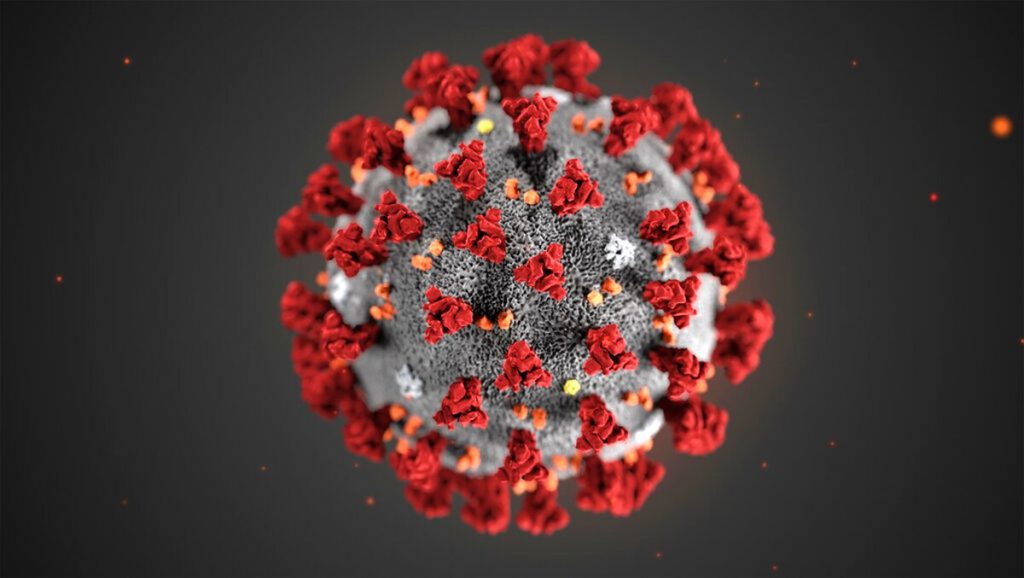COVID-19 Variant Hits Wisconsin
Research indicates it is more easily transmitted and may have led to UK's spike in infections.
The much-reported variant of COVID-19 that first emerged in England in September 2020 has been identified in Wisconsin.
The state Department of Health Services announced Wednesday that the first instance of the new variant was detected the previous day.
The new variant — called B.1.1.7 — is causing some concern, not because it is more harmful to human health, but because early evidence is suggesting that it spreads faster, and there is a risk that new mutations of the virus could give it the ability to evade the antibodies produced by vaccine or the natural immunization produced by the body after infection.
A preview of new research from the London School of Hygiene and Tropical Medicine published in December shows the variant was found to be 56% more transmissible than other previous variants of the virus.
The new variant is notable for the number of genetic mutations it underwent before it was detected in September. A recent paper in the Journal of the American Medical Association (JAMA) stated that the new variant had 17 mutations to the COVID-19 virus prior to its detection. The researchers wrote that this high number of mutations suggests “a significant amount of prior evolution” of the virus, “possibly in a chronically infected host.”
The timing of the variant’s emergence also points to a virus that is more easily transmissible. It was first detected in September, when cases were widespread, and, according to the authors of the JAMA paper, it “has seemingly achieved dominance by outcompeting an existing population of circulating variants.”
The authors say this “is strongly suggestive” that the virus has developed mutations, through natural selection, that make it “more transmissible at a population level.”
Perhaps the biggest concern among public health officials is that as the virus mutates it will become resistant to vaccine and natural immunity. There’s no evidence, the CDC said, that this is occurring. But just as the process of natural selection produced a strain of the virus that was able to out-compete and infect more hosts than previous variants, the CDC said there is a possibility that as more of the population is vaccinated, there could be “immune pressure that could favor and accelerate emergence of such variants by selecting for ‘escape mutants’.” But the CDC adds the caveat that “most experts believe escape mutants are unlikely to emerge because of the nature of the virus.
Echoing the advice of the CDC and researchers across the globe, Andrea Palm, state DHS secretary-designee said “with this new variant appearing to be even more infectious, taking preventative measures like wearing a mask and physically distancing are even more important.”
In December, the researchers at the London School of Hygiene and Tropical Medicine predicted that even under current levels of COVID-19 mitigation efforts, the increased transmissibility would “lead to a large increase in incidence.” Since those words were published the United Kingdom has experienced a massive spike in disease, unprecedented since the start of the pandemic.
Those researchers went a step further than others and said: “It may be necessary to greatly accelerate vaccine roll-out to have an appreciable impact in suppressing the resulting disease burden” from the spike in cases they they accurately predicted.
If you think stories like this are important, become a member of Urban Milwaukee and help support real, independent journalism. Plus you get some cool added benefits.
More about the Coronavirus Pandemic
- Governors Tony Evers, JB Pritzker, Tim Walz, and Gretchen Whitmer Issue a Joint Statement Concerning Reports that Donald Trump Gave Russian Dictator Putin American COVID-19 Supplies - Gov. Tony Evers - Oct 11th, 2024
- MHD Release: Milwaukee Health Department Launches COVID-19 Wastewater Testing Dashboard - City of Milwaukee Health Department - Jan 23rd, 2024
- Milwaukee County Announces New Policies Related to COVID-19 Pandemic - David Crowley - May 9th, 2023
- DHS Details End of Emergency COVID-19 Response - Wisconsin Department of Health Services - Apr 26th, 2023
- Milwaukee Health Department Announces Upcoming Changes to COVID-19 Services - City of Milwaukee Health Department - Mar 17th, 2023
- Fitzgerald Applauds Passage of COVID-19 Origin Act - U.S. Rep. Scott Fitzgerald - Mar 10th, 2023
- DHS Expands Free COVID-19 Testing Program - Wisconsin Department of Health Services - Feb 10th, 2023
- MKE County: COVID-19 Hospitalizations Rising - Graham Kilmer - Jan 16th, 2023
- Not Enough Getting Bivalent Booster Shots, State Health Officials Warn - Gaby Vinick - Dec 26th, 2022
- Nearly All Wisconsinites Age 6 Months and Older Now Eligible for Updated COVID-19 Vaccine - Wisconsin Department of Health Services - Dec 15th, 2022
Read more about Coronavirus Pandemic here


















